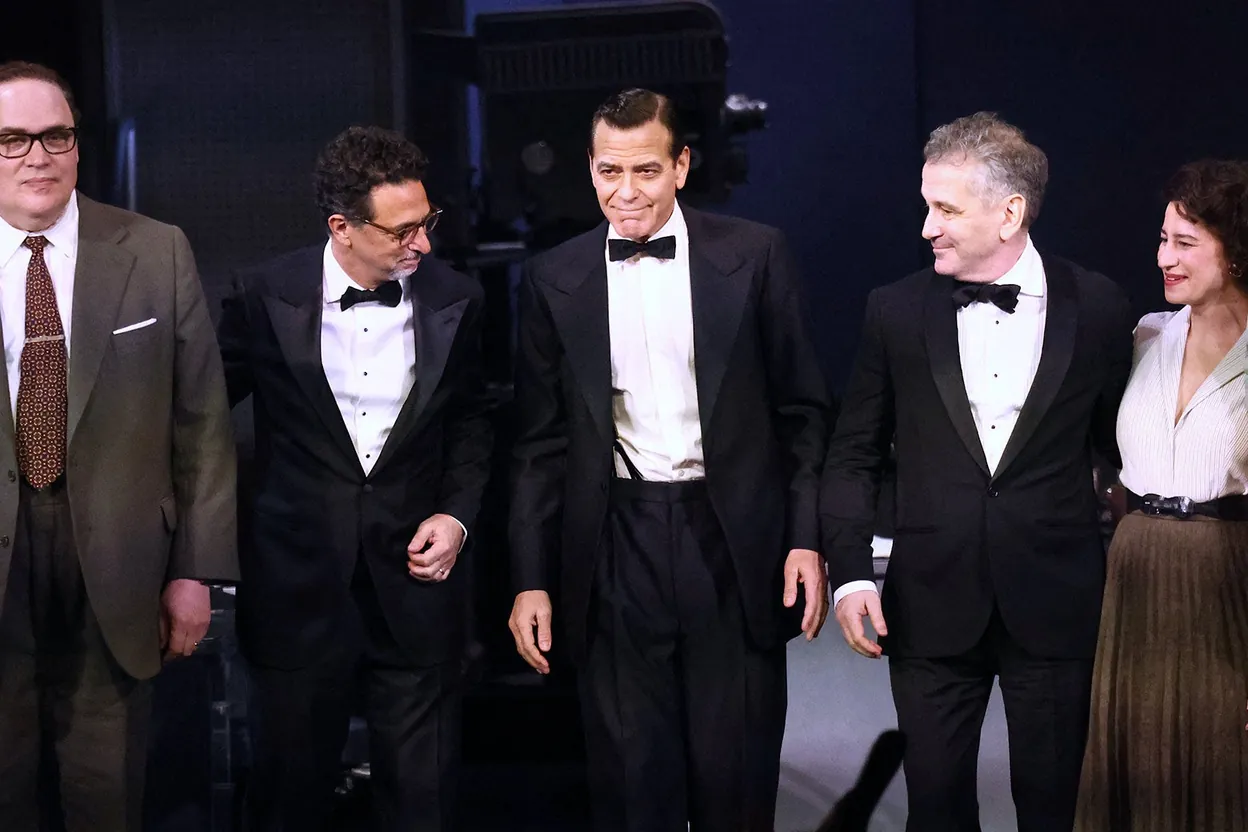Mountainhead is a pileup of the countless sad, bad truths about the people who get to paw at the levers labeled Money Spigot and Humanity’s Future, both in its fictional universe and also in our own real world.
Much like its characters, Mountainhead isn’t pleasant; much like its characters, it is persistent.
But Schwartzman knew Mountainhead sought to capture the zeitgeist of newer, more unknowable concepts like AI.
“They call themselves the smartest men in the world,” Youssef said about the characters.
“It’s interesting to watch people speak in this high tech world with its language and its rules,” Youssef said.
In 2013, a group of enterprising men who had founded Summit, an event company near Techworld, paid $40 million for Powder Mountain, a Utah ski resort that had gone into foreclosure. Their announcement at the time stated, “This is no ordinary real estate project.”. This endeavor aims to establish a hub for culture, innovation, and thought leadership. The nü-elite alpine bros proudly and loudly dreamed of the possibilities for their alpine utopia. New pow, sick recording studios, and areas to “host micro-conferencing and peace and reconciliation talks” would all be included. I could picture Andy Cohen or Lech Wałęsa holding a significant summit there one day based on their description of that final section.
When a reporter from the Guardian visited the relatively new digs a few years after purchasing the property, the Summit gang praised the “exponential opportunities” that their high-altitude enclave might offer. One of the founders blurted out, “I have this whole rap with Gertrude Stein, Katharine Graham, De’ Medici, Bauhaus,” which elevated the idea of visionary to a new level. “There is this rich history of groups coming together, where the whole is more than the sum of the parts, right?” Based on calculations like that, Summit’s endeavor was estimated to be in debt by about $100 million by 2023. That’s what multibillionaire Reed Hastings, a co-founder of Netflix, says. He jumped in and took over the resort’s majority ownership. Since then, Hastings has been working to make even more of the mountain exclusive to members while also investing in new ski lifts. That’s high agency, darling!
All of this is mentioned because, while watching Mountainhead, the made-for-HBO movie written and directed by Jesse Armstrong of Succession, I couldn’t help but think back on the entire PowMow circle of life. It also features a few enterprising cybermachers who are surveying snowy Utah landscapes, questioning their futures, and dropping names.
With Steve Carell, Ramy Youssef, Cory Michael Smith, and Jason Schwartzman portraying three billionaires and one pathetic half-billion-dollar tryhard, Mountainhead is a proud piece of fiction—a by-design farce. Although I’m still patiently waiting, Armstrong’s work explores a similar space in his own unique voice as I’ve been saying for years that I wanted to see a wintry White Lotus season at the Yellowstone Club. What would happen if the Pied Piper bois of Silicon Valley missed their reservation at that restaurant from The Menu because their private jets were inadvertently diverted through Years and Years’ dystopian airspace? Mountainhead’s response includes a bowling ball, a menacing sauna, AI deepfakes, a cherub wearing a Moncler onesie, the assassination of the Paris mayor, references to the planet Earth as “this fuckin’ rock” and “a fine starter planet,” death sentences, eternal consciousness uploaded to the cloud, and the significance of the world trade in cheese. Sounds about right.
In both its fictional universe and our own real world, Mountainhead is a collection of the innumerable depressing facts about the individuals who get to paw at the levers marked Money Spigot and Humanity’s Future. I laughed at the high-concept, high-altitude real estate disputes of the past while watching it, but I also shuddered at the drama that would inevitably unfold in some AI-enamored future. Its themes converge with headlines about “NoLIta Crypto Torture,” the most recent smug DOGE mess, and frightening new legislation. A bathrobe, an Italian, a “Crypto King of Kentucky,” a forgotten $600 Blue Ribbon Sushi delivery, and personalized gag T-shirts are all items that I doubt even Armstrong would want to include in the same story. It’s good that there are still surprises in the world. ().
Like its characters, Mountainhead is persistent and not pleasant. Which is appropriate given that the project’s central theme is the world’s most renewable resource: a group of men who are constantly fed by their own waste.
When he signed on to play Hugo Van Yalk, Schwartzman wasn’t entirely sure what he was getting into. The man with less money than everyone else in his desired circle was the archetypal, archetypal kind of guy that his character embodied. As the insecure host of a four-man poker night, he brings together a group of former rivals, co-investors, and enemies who go by the name of the Brewsters and appear to have crossed paths during their go-to-market excursions. I feel like they’re very Y Combinator-esque. He is accompanied by a character named Randall (Carell), whom the guys also refer to as Papa Bear; Jeff (Youssef), a phony humble rising star who created AI real-or-not detection technology that he refers to as a “filter for nightmares”; and Venis (Smith), the wealthiest and most seemingly ignorant man in the world. In all of them, Schwartzman’s character is referred to as “Soupy,” which is short for “Soup Kitchen.”. His business, Slowzo, is a mid-meditation app that has made him worth approximately $500,000,000.
Schwartzman, however, was aware that Mountainhead aimed to capture the spirit of more recent, unknown ideas, such as artificial intelligence. The technology is like a sorry-not-sorry ghost haunting Mountainhead, causing irresponsible financial market meltdowns, chaos, and violence. The characters are obsessed with ideas of the future, such as accelerationism and the development of transhuman technology. Schwartzman shared with me what he said to Armstrong in an earlier Zoom interview with The Ringer this month: “You know, I know very little about … certain elements that are in this movie.”. Do you have any suggestions for me, such as a book I should read or a film I ought to see?
Armstrong certainly did. “A Dropbox link,” Schwartzman remembered, his expression stunned. There are so many books. There are 2,000 hours of podcasts, 50 books, and 100 articles. This is going to be difficult, I thought. (Of all the work-related risks associated with being an actor, such as rejection, immediate celebrity, remote filming, and spending a lot of time in the gym, the one that no one alerts you to is the prospect of an All-In Podcast backlog. The amount of information was liberating in a sense; Schwartzman knew he would be in capable, if compulsive, hands. By spending so much time with it, Schwartzman claimed that Armstrong “knows so much about it in a way that I will never know as deeply.”. “.”.
Regarding Mountainhead, time is relative. Cory Michael Smith, who plays Venis, laughed when I asked the actors about their initial description of the project, which is my standard opening question. “Fortunately,” he said, “I remember everything because it was three months ago. The fact that Mountainhead was pitched, greenlit, filmed, edited, and released in a matter of months rather than the customary years shows that he is not exaggerating. In his eagerness to collaborate with the man behind Succession, Smith signed on before the script was even complete.
That second question partially addresses the first: Armstrong told Bloomberg that he would rather not have to spend too much time thinking about the directing craft. Why the rush? Especially when Armstrong is a first-time director. He was more concerned with his movie being able to stand alone. He was aware of how easily the world could make accuracy obsolete. “I think it’s really important that we get it out on time, but the character dynamics are timeless,” Youssef said. That’s Jesse’s actual explanation. “Look,” he said, “this technology is developing so rapidly.”. Let’s discuss it while it’s still in its most infancy. “.”.
The accelerated timeline becomes more logical when you realize that Armstrong didn’t come up with this idea overnight. He had been thinking about a particular mover and shaker genre for over a year by the time he pitched his idea to HBO. Dropbox didn’t put together itself.
In 2023, a few months after finishing the fourth and last season of his satirical starmaker Succession, Armstrong joined the Times Literary Supplement as a freelance book reviewer. He was asked to comment on Michael Lewis’s recently released book Going Infinite, which chronicles the ascent and decline of well-known cryptocurrency enthusiast Sam Bankman-Fried. In his November 2023 essay, Armstrong wrote, “Horace Walpole noted that the world is a tragedy to those who feel and a comedy to those who think.” This was around the time that Bankman-Fried was being found guilty of fraud in federal court. He went on to say, “You could savagely satirize the crazy snakes and ladders of the crypto wild west described in Going Infinite.”. But it’s also tragic if you care about these young people’s lives. “”.
Armstrong ventured down the bizarre rabbit hole of the tech and tech-related podcastverse to investigate Bankman-Fried. He was mesmerized by the terms and the very particular cadence, which seemed to be a form of expression unto itself. There are so many terms that are constantly being used, gaining popularity, being repeated, and becoming stale.
Youssef mentioned “first principles” as one example. Steelman. . Unfalsifiable. Deepfakes. What makes watching Mountainhead so squirmy is the vernacular. When I hear someone say something like this, I usually switch the channel or go somewhere else. “You want me to sit here and watch these unlikeable people?” was a criticism that I used to understand when Succession was on TV, but I didn’t agree with it because my dirty secret was that I liked them all just fine. Not in Mountainhead, though. I scowled as I watched it for the first time.
The characters, according to Youssef, “call themselves the smartest men in the world.”. “And they’re so not, right?” Papa Bear cites both simple and obscure statistics, such as the fact that 10 people suffer heart attacks during the Super Bowl each year and that no nation with a consumer cheese that is traded internationally has ever defaulted on its national debt. He then revels in the praise he believes he deserves for having such a Snapple-lid brain. As if it were a board game, the characters discuss the growing chaos in the world, dismissing one nation as “de minimus.”. “”.
Yes, it is unbearable, but so are the individuals who served as the project’s influences. Even the most powerful people in society still feel like they have a lot to prove. “Watching people talk in this high-tech world with its language and its rules is interesting,” Youssef remarked. It’s strangely emotional despite being stiff. Even in the most uninteresting podcast, you can sort of hear beneath some of these guys’ voices: “Do you guys love me NOW?” I was still irritated by all the crazy snakes and ladders the second time I watched Mountainhead. However, I also discovered that I was beginning to sense the minor tragedies beneath them.
In certain ways, Armstrong isn’t all that dissimilar from a tech founder who has a successful TED Talk. He likes to work and carry out his strategic vision with a group of reliable partners. They feature composer Nicholas Britell, who Armstrong referred to as adding a “technofeudalism” sonic touch, as well as Succession alumni Frank Rich, Will Tracy, and Lucy Prebble. Despite his attempts to convince you otherwise, he has a strategic vision. Schwartzman remarked, “He’s so inclusive, so collaborative, and so kind.”. He is willing to hear your thoughts and try anything you would like. In addition, it’s really unique to him. “”.
Furthermore, even though he would never use that phrase, the way he explains that one item sounds a lot like someone going to the fundamentals. “Comedies can be very effective when logical ideas are taken to their irrational, extreme forms,” Armstrong stated. Thus, too, is that unexplored region, or the unexplored middle ground, where assurance gives way to conceit. “.”.
What makes Mountainhead significant is how immediate it is. It’s a map, not a trip. Netflix’s recent announcement of a new series titled The Altruists, which is based on the lives of Bankman-Fried and Caroline Ellison, served as a reminder of how long it typically takes for stories to air when you don’t have the energy to move quickly and break things.
Armstrong asked me, “Do you think there’s a part of him that was for real about effective altruism?” after I told him that I had covered Bankman-Fried’s trial for a month.
I do, of course. Bankman-Fried’s defunct Blogspot is one primary source document that evokes these feelings in me. It was mostly about baseball sabremetrics, but you could see his initial interest in utilitarianism and, almost instantly, effective altruism seeping in. I find that pipeline to be quite realistic in every way. That’s why it also appears to be true that the pipeline exploded into something more destructive somewhere along the way.
The tenets of the EA philosophy evolved into a flywheel in Bankman-Fried’s case, serving as a means of access and a rationale for the amassing of unimaginable wealth that placed him in close proximity to some extremely intelligent individuals (and power). Another Sam, Sam Altman, the founder of OpenAI, also rose to fame shortly after Armstrong’s book review was released. AI now has all the horses, whereas when Armstrong wrote the article, crypto was the wild west. I recently discovered some old Altman lore that served as a reminder of how drastically things change, just as I was revisiting Bankman-Fried’s old blog. Paul Graham, a papa bear in his own right, wrote of his protégé, “You could parachute him into an island full of cannibals and come back in five years and he’d be the king.”.
Altman was wearing double-popped collars and trying to get his location app Loopt to work back in 2008. Even if it didn’t prevent them from evolving into their more evil forms, I’m happy (“glad”) that we have a reminder of what cannibal kings looked like in the past.
Mountainhead descends into wild, creative violence, as all good farces do. At one point, the Brewsters argue and joke about how, whether, and why they would kill one of their own to get access to Soupy’s killer app, which is the closest thing to the intellectual salon and the poker game he originally envisioned. (I read about the NoLIta Crypto Torture because of this scene in the movie; you can’t make this stuff up. ().
One of them responds, “On utilitarian grounds, if we agree that the greatest happiness for the greatest number occurs in the absence of Jeff, then logically the question is not why would we kill Jeff, but why wouldn’t we?” Another responds, “Morally, I personally would have to be able to prove on first principles that his death would save a net multiplicity of future lives.”. “”.







